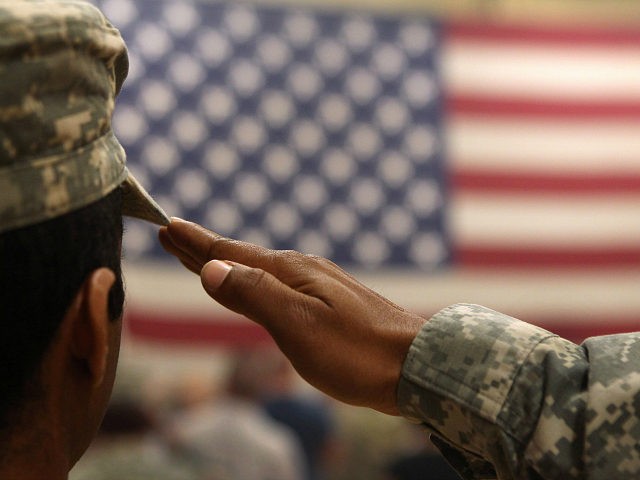A year-long Biden Pentagon effort to identify extremists in the military found that “fewer than 100” service members out of a 2.1 million-member force engaged in “prohibited extremist activity” over the past year.
The long-awaited official estimate was released in a report on Monday that summarized the results of the effort by Defense Secretary Lloyd Austin.
Before the report, Pentagon officials said they did not know how many “extremists” were in the military or what the definition of “extremist” was, but Austin launched an effort to root them out after a handful of troops and dozens more veterans participated in the January 6 Capitol protests.
The report released on Monday still does not provide a definition of “extremist,” but expands on what constitutes “extremist activities” and “active participation” in support of extremism, which includes social media activity.
Previously, Department of Defense instruction 1325.06 said:
Active participation includes, but is not limited to, fundraising; demonstrating or rallying; recruiting, training, organizing, or leading members; distributing material (including posting online); knowingly wearing gang colors or clothing; having tattoos or body markings associated with such gangs or organizations; or otherwise engaging in activities in furtherance of the objective of such gangs or organizations that are detrimental to good order, discipline, or mission accomplishment or are incompatible with military service.
The updated instruction adds that “active participation” includes:
…
(k) When using a government communications system and with the intent to support extremist activities, knowingly accessing internet web sites or other materials that promote or advocate extremist activities.
(l) Knowingly displaying paraphernalia, words, or symbols in support of extremist activities or in support of groups or organizations that support extremist activities, such as flags, clothing, tattoos, and bumper stickers, whether on or off a military installation.
(m) Engage in electronic and cyber activities regarding extremist activities, or groups that support extremist activities – including posting, liking, sharing, re-tweeting, or otherwise distributing content – when such action is taken with the intent to promote or otherwise endorse extremist activities. Military personnel are responsible for the content they publish on all personal and public Internet domains, including social media sites, blogs, websites, and applications.
The new instruction does not define which organizations or groups are considered extremist. Pentagon Press Secretary John Kirby said the omission was by design, since groups often change and not everyone who participates in extremist activity is part of a group.
“Keeping it to a group dynamic would actually limit our ability to deal with the issue,” Kirby said during a press briefing on Monday. He added that there was also no federal list of groups, and it would be inappropriate for the Pentagon to establish one.
The instruction also does not outline what “paraphernalia, words, or symbols” are “in support of extremist activities.”
Breitbart News first exclusively reported in February that Special Forces commanders at Fort Bragg were warned against using “Pepe the Frog” or the Three Percenter logo popular among service members and veterans.
The new instruction also broadens “extremists activities” to include advocating widespread unlawful discrimination based on “sex (including pregnancy), gender identity, or sexual orientation.”
Mike Berry, general counsel for First Liberty Institute, told Breitbart News, the new policy will have a “chilling effect” on free speech.
“The new DOD policy is very questionable constitutionally speaking. It is very susceptible to a constitutional challenge on First Amendment grounds because it’s not clear whether someone would be in violation of the new policy just for expressing their support for an organization that supports traditional marriage or pro-life values,” he said.
In regards to “liking” a social media post, Kirby argued that “liking” amounted to “advocating.” Kirby continued:
The physical act of liking is, of course, advocating, right? And advocating for extremist groups that certainly, you know, groups that advocate in the violating the oath to the Constitution, the overthrow of the government, terrorist activities, liking is an advocation, and that’s laid out clear in the instruction.
He denied anyone would be monitoring troops’ social media activity, saying it referred to cases that come “to light,” adding:
There’s no monitoring. This is not — it’s not about monitoring. There’s no methodology in here. There’s no intent. We don’t even — there’s no ability for the Department of Defense to monitor the personal social media content of every member of the armed forces. And even if there was, that’s not the intent here.
What we’re talking about is a case where, for instance, it came to light that an individual on social media openly advocated, forwarded, encouraged the dissemination of prohibited extremist material. That would have to come to light through various streams of reporting. It wouldn’t be something that the command or the department’s going to be actively fishing for.
Asked specifically if a service member liking a post that says “Joe Biden is not the president” would be considered extremism, Kirby declined to say.
“I’m not going to get into specific hypotheticals,” he said.
Kirby insisted it had nothing to do with personal or political views. “This isn’t about political leanings or partisan inclinations. It’s about activity. It’s about prohibited extremist activity and active participation in that activity,” he said.
But, he added, “If you are advocating for the overthrow of the government, if you’re advocating for the use of violence or force against an individual or a group based on who that individual is or that group is, I mean, it’s all in here. If you’re advocating for domestic terrorism, if you’re advocating for, as I said, the overthrow of the government, or you’re actively undermining the oath you took to the Constitution to support and defend the Constitution of the United States, then all that fits.”
Follow Breitbart News’s Kristina Wong on Twitter or on Facebook.

COMMENTS
Please let us know if you're having issues with commenting.